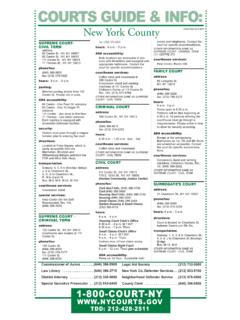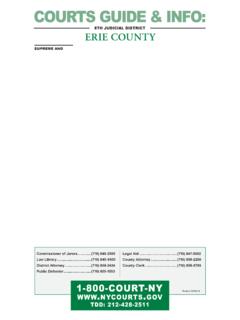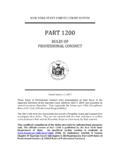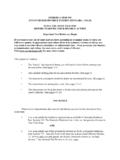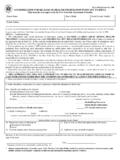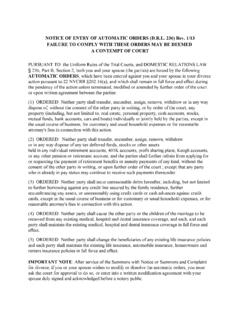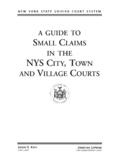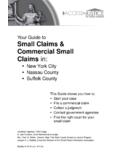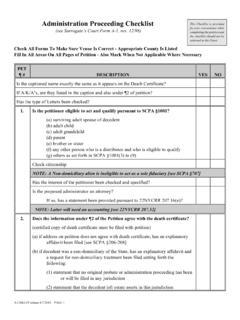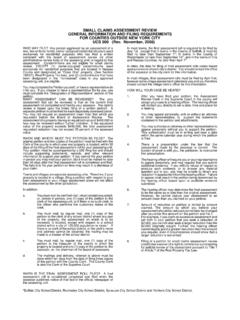Transcription of Section 202.70 Rules of the Commercial Division of the ...
1 Section Rules of the Commercial Division of the Supreme Court (a) Monetary thresholds Except as set forth in subdivision (b), the monetary thresholds of the Commercial Division , exclusive of punitive damages, interests, costs, disbursements and counsel fees claimed, are established as follows: Albany county Eighth Judicial District Kings county Nassau county New York county onondaga county Queens county Seventh Judicial District Suffolk county Westchester county $50,000 $100,000 $150,000 $200,000 $500,000 $50,000 $100,000 $50,000 $100,000 $100,000 (b) Commercial cases Actions in which the principal claims involve or consist of the following will be heard in the Commercial Division provided that the monetary threshold is met or equitable or declaratory relief is sought: (1) Breach of contract or fiduciary duty, fraud, misrepresentation, business tort ( , unfair competition), or statutory and/or common law violation where the breach or violation is alleged to arise out of business dealings ( , sales of assets or securities; corporate restructuring; partnership, shareholder, joint venture, and other business agreements; trade secrets; restrictive covenants; and employment agreements not including claims that principally involve alleged discriminatory practices); (2) Transactions governed by the Uniform Commercial Code (exclusive of those concerning individual cooperative or condominium units); (3) Transactions involving Commercial real property, including Yellowstone injunctions and excluding actions for the payment of rent only.
2 (4) Shareholder derivative actions -- without consideration of the monetary threshold; (5) Commercial class actions -- without consideration of the monetary threshold; (6) Business transactions involving or arising out of dealings with Commercial banks and other financial institutions; (7) Internal affairs of business organizations; (8) Malpractice by accountants or actuaries, and legal malpractice arising out of representation in Commercial matters; (9) Environmental insurance coverage; (10) Commercial insurance coverage ( directors and officers, errors and omissions, and business interruption coverage); (11) Dissolution of corporations, partnerships, limited liability companies, limited liability partnerships and joint ventures -- without consideration of the monetary threshold; and (12) applications to stay or compel arbitration and affirm or disaffirm arbitration awards and related injunctive relief pursuant to CPLR Article 75 involving any of the foregoing enumerated Commercial issues.
3 Where the applicable arbitration agreement provides for the arbitration to be heard outside the United States, the monetary threshold set forth in Section (a) shall not apply. (c) Non- Commercial cases The following will not be heard in the Commercial Division even if the monetary threshold is met: (1) Suits to collect professional fees; (2) Cases seeking a declaratory judgment as to insurance coverage for personal injury or property damage; (3) Residential real estate disputes, including landlord-tenant matters, and Commercial real estate disputes involving the payment of rent only; (4) Home improvement contracts involving residential properties consisting of one to four residential units or individual units in any residential building, including cooperative or condominium units; (5) Proceedings to enforce a judgment regardless of the nature of the underlying case.
4 (6) First-party insurance claims and actions by insurers to collect premiums or rescind non- Commercial policies; and (7) Attorney malpractice actions except as otherwise provided in paragraph (b)(8). (d) Assignment to the Commercial Division (1) Within 90 days following service of the complaint, any party may seek assignment of a case to the Commercial Division by filing a Request for Judicial Intervention (RJI) that attaches a completed Commercial Division RJI Addendum certifying that the case meets the jurisdictional requirements for Commercial Division assignment set forth in subdivisions (a), (b) and (c) of this Section . Except as provided in subdivision (e) below, failure to file an RJI pursuant to this subdivision precludes a party from seeking assignment of the case to the Commercial Division .
5 (2) Subject to meeting the jurisdictional requirements of subdivisions (a), (b) and (c) of this Section and filing an RJI in compliance with subsection (d)(l) above, the parties to a contract may consent to the exclusive jurisdiction of the Commercial Division of the Supreme Court by including such consent in their contract. A sample choice of forum provision can be found at Appendix C to these Rules of the Commercial Division . Alternatively, subject to meeting the jurisdictional and procedural requirements applicable to the Commercial Division and the federal courts, the parties to a contract may consent to the exclusive jurisdiction of either the Commercial Division of the Supreme Court or the federal courts in New York State by including such consent in their contract. An alternative sample choice of forum provision to that effect can also be found at Appendix C to these Rules of the Commercial Division .
6 In addition, the parties to a contract may consent to having New York law apply to their contract, or any dispute under the contract. A sample choice of law provision can be found at Appendix D to these Rules of the Commercial Division . (e) Transfer into the Commercial Division If an RJI is filed within the 90-day period following service of the complaint and the case is assigned to a noncommercial part because the filing party did not designate the case as " Commercial " on the RJI, any other party may apply by letter application (with a copy to all parties) to the Administrative Judge, within ten days after receipt of a copy of the RJI, for a transfer of the case into the Commercial Division . Further, notwithstanding the time periods set forth in subdivisions (d) and (e) of this Section , for good cause shown for the delay a party may seek the transfer of a case to the Commercial Division by letter application (with a copy to all parties) to the Administrative Judge.
7 In addition, a non- Commercial Division justice to whom a case is assigned may sua sponte request the Administrative Judge to transfer a case that meets the jurisdictional requirements for Commercial Division assignment set forth in subdivisions (a), (b) and (c) of this Section to the Commercial Division . The determinations of the Administrative Judge with respect to any letter applications or requests under this subdivision shall be final and subject to no further administrative review or appeal. (f) Transfer from the Commercial Division (1) In the discretion of the Commercial Division justice assigned, if a case does not fall within the jurisdiction of the Commercial Division as set forth in this Section , it shall be transferred to a non- Commercial part of the court. (2) Any party aggrieved by a transfer of a case to a non- Commercial part may seek review by letter application (with a copy to all parties) to the Administrative Judge within ten days of receipt of the designation of the case to a non- Commercial part.
8 The determination of the Administrative Judge shall be final and subject to no further administrative review or appeal. (g) Rules of practice for the Commercial Division Unless these Rules of practice for the Commercial Division provide specifically to the contrary, the Rules of Part 202 also shall apply to the Commercial Division , except that Rules 7 through 15 shall supersede Section (Preliminary Conference) and Rules 16 through 24 shall supersede Section (Motion Procedure). Preamble Created in 1995, today s Commercial Division of the New York State Supreme Court is an efficient, sophisticated, up to date court dealing with challenging Commercial cases. From its inception, the Commercial Division has had as its primary goal the cost effective, predictable and fair adjudication of complex Commercial cases.
9 By virtue of its specialized subject matter jurisdiction, exceptional judicial expertise, Rules and procedures dedicated to Commercial practice, and commitment to high standards of attorney professionalism, the Division has established itself at the forefront of worldwide Commercial litigation in the twenty-first century. (1) Jurisdiction and Judiciary The subject matter jurisdiction of the Commercial Division including both substantial monetary thresholds and carefully chosen case types (see [a] and [b]) is designed to ensure that it is the forum of resolution of the most complex and consequential Commercial matters commenced in New York s courts. Accordingly, the Division s judges are chosen for their extensive experience in resolving sophisticated Commercial disputes. Unlike jurists in other civil parts in New York s court system, Commercial Division justices devote themselves almost exclusively to these complex Commercial matters.
10 (2) Rules and Procedures Since its inception, the Commercial Division has implemented Rules , procedures and forms especially designed to address the unique problems of Commercial practice. Such Rules have addressed a wide range of matters such as proportionality in discovery, optional accelerated adjudication, robust expert disclosure, limits on depositions and interrogatories, streamlined privilege logs, special Rules concerning entity depositions, model forms to facilitate discovery, expedited resolution of discovery disputes, simplification of bench trials, time limits on all trials, streamlined presentation of evidence at trials, and a strong commitment to early case disposition through the Division s alternative dispute resolution program. Equally important, through the work of the Commercial Division Advisory Council a committee of Commercial practitioners, corporate in-house counsel and jurists devoted to the Division s excellence the Commercial Division has become a recognized leader in court system innovation, demonstrating an unparalleled creativity and flexibility in development of Rules and practices.
